Can Section 34 of the Trademark Act Protect Small Businesses? The 'Burger King' Case
- Lawttorney.ai

- Apr 4, 2025
- 5 min read
Updated: Apr 7, 2025
Case Name: Anahita Irani v. Burger King (SLP(c) 6282/2025)
Introduction:
What happens when a small, family-run restaurant faces off against a global fast-food giant over the same name? This is the reality for a Pune-based eatery called "Burger King," which is locked in a legal battle with the American fast-food chain, Burger King Corporation.
The case raises critical questions about trademark rights, brand ownership, and whether a local business with prior use of a name can stand its ground against a global powerhouse. In July 2024, a Pune court ruled in favor of the local restaurant, recognizing it as the "prior and honest user" of the name since the 1990s. However, the Bombay High Court later overturned this ruling, ordering the Pune eatery to stop using the name. Now, the Supreme Court is set to deliver the final verdict.
Key questions for Consideration:
|

How Section 34 of the Trademark Act Protects Prior Users in Trademark Disputes
The conflict began when Burger King Corporation, an American fast-food giant Burger King Corporation founded in 1954 (operating in over 100 Countries), sued the Pune-based “Burger King” restaurant in 2011. The multinational company argued that its global trademark rights had been violated and sought ₹20 lakh in damages, along with a permanent injunction to stop the Pune eatery from using the "Burger King" name.
The Pune restaurant, on the other hand, was established in 1992 and had been operating under the name long before the American chain entered the Indian market in 2014. In August 2024, the Pune Commercial Court ruled in favor of the local restaurant, affirming its rights as a prior user. However, in December 2024, the Bombay High Court reversed the decision, granting an interim injunction against the Pune eatery.
The case highlights how Section 34 of the Trademark Act plays a crucial role in protecting prior users of a trademark. Indian trademark law prioritizes those who have used a name first, even if a larger corporation later registers it. This provision is essential in balancing the rights of small businesses against multinational corporations seeking exclusive brand ownership.

Key Legal Questions in the Case :
1. Who Has the Stronger Claim Under Indian Trademark Law?
Indian trademark law protects those who use a name first, even if someone else later registers it. Section 34 of the Trademarks Act, 1999, states that a business that has been using a trademark before another party's registration has the right to continue using it.
The Pune eatery argues that it has been using the name since 1992, while Burger King US only started its Indian operations in 2014. Similar cases, like Syed Ghaziuddin v. PepsiCo (2019), have ruled in favor of local businesses that had been using a name before a multinational entered the market.
2. Does a Global Brand’s Reputation Override Local Rights?
In trademark law, the "transborder reputation" doctrine protects well-known international brands, even in countries where they do not operate. This principle was established in NR Dongre v. Whirlpool (1996). However, Indian courts also consider local presence. Since Burger King US had no Indian outlets before 2014, the Pune eatery claims the company cannot assert exclusive rights.
3. Is There a Risk of Consumer Confusion?
Under Section 29(2)(c) of the Trademarks Act, a trademark is considered infringing if it confuses consumers. The Pune eatery, with only two outlets, argues there’s no confusion. Burger King US, however, insists that any similar name weakens its brand.
Legal Precedents Supporting Each Side
In Toyota Jidosha Kabushiki Kaisha v. Prius Auto Industries Ltd. (2018), the Supreme Court ruled that Toyota could not claim exclusive rights over the "Prius" trademark in India because it was not widely recognized before a local company began using it. This case supports the Pune eatery’s argument that mere global reputation does not automatically grant trademark rights in India.

On the other hand, in Renaissance Hotel Holdings v. B Vijaya Sai (2022), the Supreme Court held that even minor similarities in names could lead to trademark infringement. This decision strengthens Burger King US’s claim that its globally recognized trademark should be protected in India, even if a local business is using a similar name.

Arguments Before the Supreme Court
The local restaurant's lawyers argued that stopping them from using the name "Burger King" while the case was still in court could cause serious problems. Since the appeal process in the Bombay High Court could take a long time, they said it would be unfair to make them change their name before a final decision. They also pointed out that rebranding would permanently harm their business.
On the other hand, Burger King Corporation argued that the case in the Bombay High Court was moving quickly, so there was no need to delay its order. They also said that letting another restaurant use the same name could confuse customers and harm the global brand’s reputation in India.
Supreme Court’s Ruling
The Supreme Court ultimately ruled in favor of the Pune-based eatery, granting it temporary relief by staying the Bombay High Court’s injunction.
Key Observations by the Apex Court:
The Pune-based eatery operated only two outlets, whereas Burger King Corporation was a multinational brand with extensive market presence.
The court recognized the potential negative impact of an interim stay, particularly given the local business's long-standing operations under the name.
By staying the High Court’s order, the Supreme Court ensured that the local restaurant could continue using the name "Burger King" until the case reached a final resolution.
This latest development in the case underscores the delicate balance between global trademark rights and small business protections. As the legal battle continues, the final verdict will likely set a precedent for future intellectual property disputes in India.
Empower Your Legal Practice with AI
Are you a legal professional? Stay ahead with our innovative Lawttornet.AI tool. Streamline your legal processes, enhance productivity, and gain a competitive edge. Experience the future of legal technology—try our free Webinar session today!




Comments